Democratic Primary Voters Still Touch Grass

This August, Third Way worked with Global Strategy Group to conduct an online survey of 1,400 registered voters who are likely to vote in a Democratic presidential primary. The purpose was to understand who the people are that will likely determine the next Democratic nominee for president, what they value, and what they want to see in the next Democrat at the top of the ticket. The 2028 primary is still a long way away, but countless hopefuls are already floating trial balloons, and gallons of ink has already been spilled profiling potential 2028 candidates, including their strategies and “lanes.” Too often, a stereotype of primary voters has distorted these conversations, with the most recent case study being 2019, when dozens of hopefuls spent months leapfrogging each other to the left, only to be beat by Biden, who won the nomination by playing for the average voter rather than the likes of social media.
Given the inevitable pressure that will be wielded by advisors, elites, and the loudest activists throughout this process, we believe it is imperative to keep the conversation focused on typical Democratic primary voters, hence this first, early analysis in what will be a series of deep dives into that universe. Many attributes, characteristics, and values emerged from the research. But perhaps the most telling was the extent to which the perspective of most Democratic primary voters diverges from the small subset that’s terminally online.
- The average Democratic primary voter is center-left. Despite the frequent headlines, the party has not been overrun by socialists and the terminally online.
- Democratic primary voters want someone authentic, honest, and accountable, and they want a candidate’s guiding star to be about making progress over ideological purity.
- Voters are looking for a winner, which they believe is someone who is relatable and down-to-earth and hasn’t taken stances that alienate them from the average American.
Who Are the Likely Democratic Primary Voters?
To understand what Democratic primary voters want, we must first look at who they are. The modal primary voter is a white non-college-educated woman who is over 55 years old and consumes news frequently but doesn’t post much on social media.
The universe of folks who already say they are likely to participate in a 2028 Democratic primary is around 62% female to 38% male. This electorate is also an older one, with 55% of voters being 55 years of age or older. Seniors make up 38% of this electorate; by contrast, those under 30 years of age clock in at only 12% of likely primary voters.
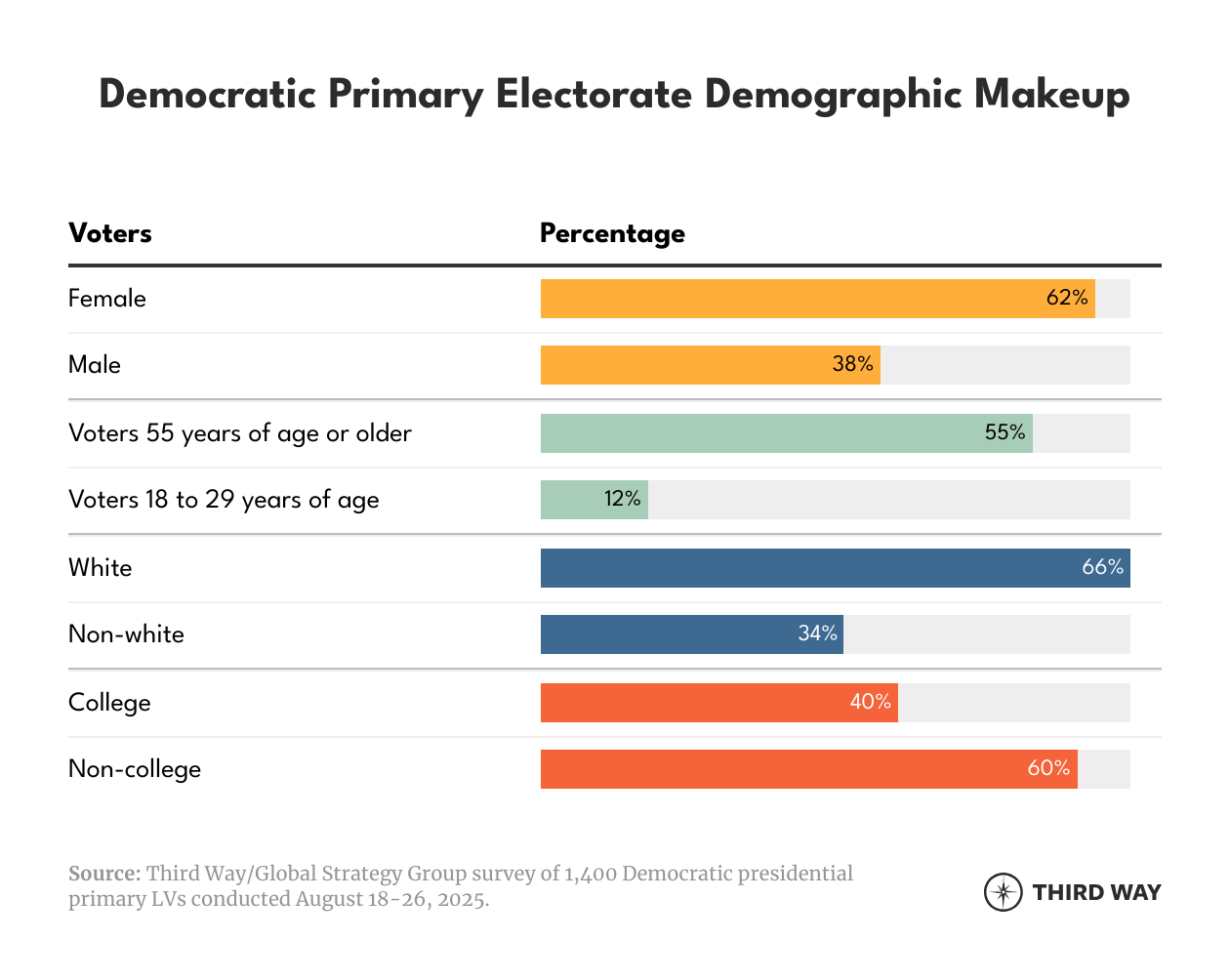
Primary voters on the Democratic side are 66% white and 34% non-white, including 21% Black and 10% Latino. Only 40% have a college degree, while 60% say they do not have a college degree. In all, white college-educated voters make up 29%, compared to 37% for non-college white voters, which means the plurality of likely Democratic primary voters fall in that latter category.
The primary voting universe is one that consumes news but doesn’t frequently post on social media. In terms of news consumption, 67% say they seek out news compared to 33% who say they casually consume news when it comes across their normal daily life. However, that number essentially flips when it comes to posting on social media. Only 21% of primary voters post on social media daily. A near super-majority (64%) say they post monthly or less. In fact, more people never post (31%) than the proportion who post daily.
Daily posters are 20 points more likely to say politics is a very important part of their personal identity than the average primary voter. They are seven points more likely to be “strong” Democrats than the average primary voter. They are seven points more likely to be under 30 years of age than the average primary voter as well.
When asked to describe their ideology among six options, it is clear the primary electorate is still center left:
- 40% described themselves as liberal;
- 33% said they were moderate;
- 11% called themselves progressive;
- Only 5% self-described as “socialist,” the same proportion of primary voters that called themselves conservative.
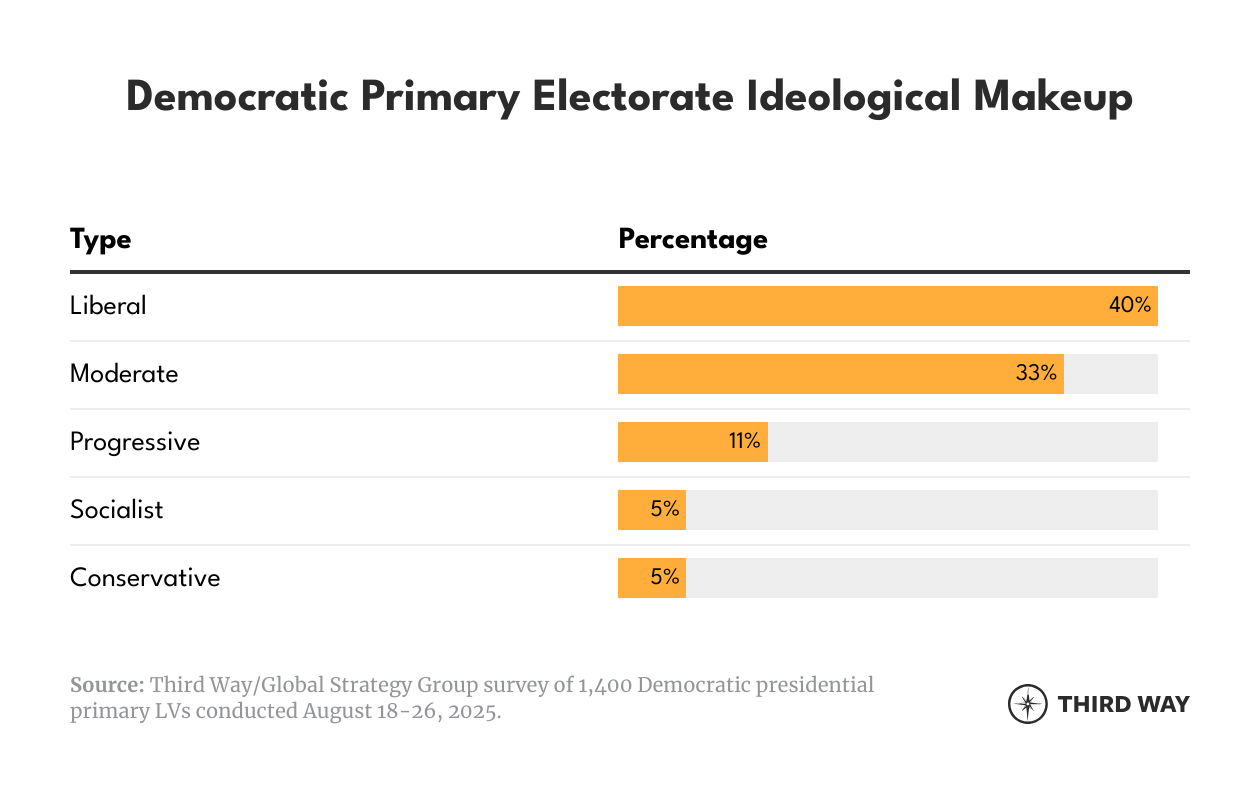
The socialists and daily posters among this universe diverged from the rest of the electorate as we dove into values, issues, and candidate preferences.
What Do Primary Voters Value?
These Democratic primary voters say the most important values to them personally are honesty (65%), respect (57%), and family (53%).
In terms of what they want to see in elected officials, the values that rise to the top are honesty (76%) and accountability (52%). Honesty is the most important value for liberals, moderates, and conservatives. It is in the top three for progressives but is not viewed as important by self-described socialists. Progressives and socialists value equality and empathy, but the most important value for socialists is justice at 70%. This does not rank in the top six for any other group.1
When we asked a forced choice question on the role of government, 78% of Democratic primary voters said it was ensuring equality of opportunity over equality of outcomes. Liberals were the most likely to choose opportunity at 85%, and no other group except socialists lagged far behind that watermark. With socialists, the percentage who wanted equality of outcomes was double the general primary electorate at 46%.
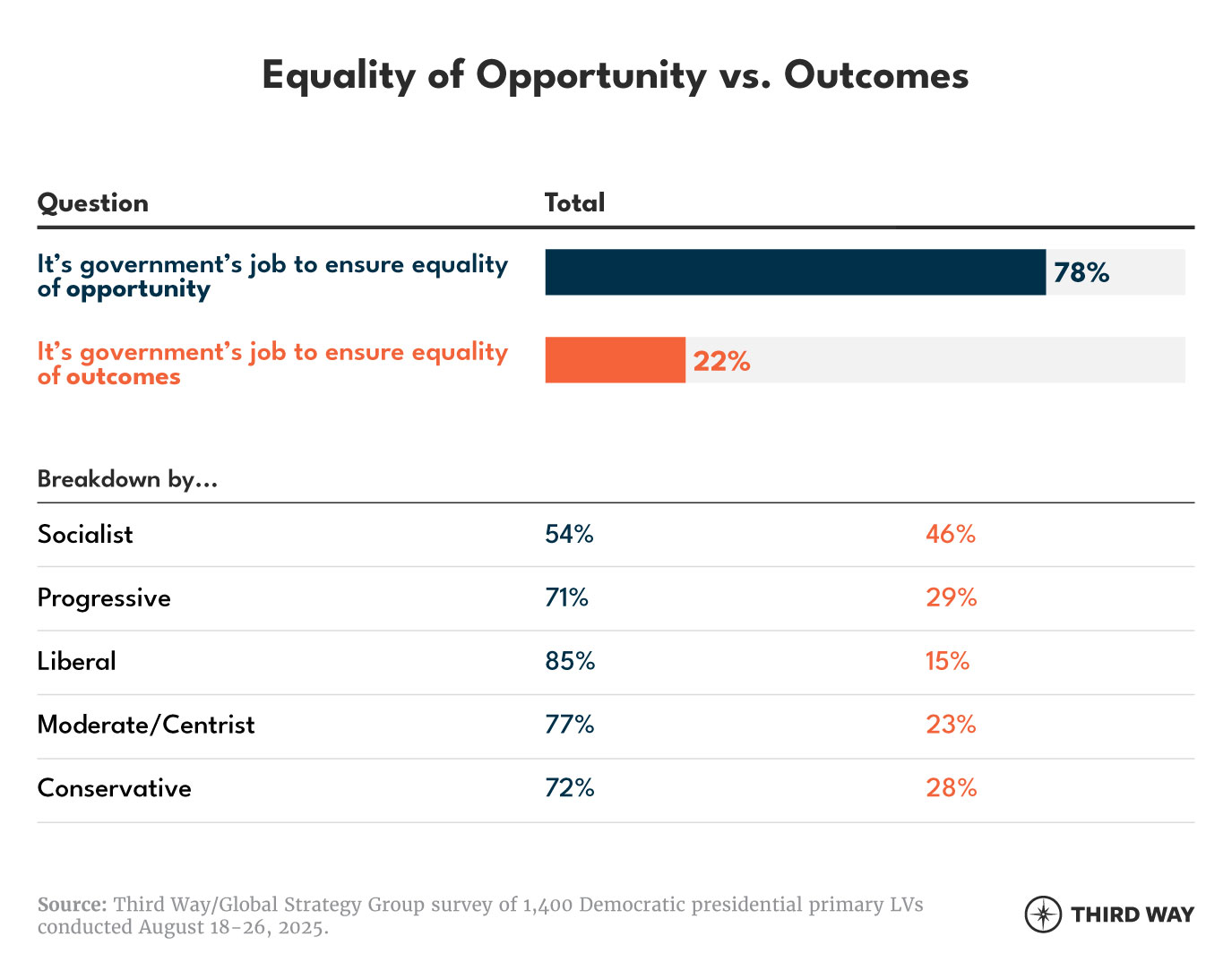
When asked about dissatisfaction with the political system, most primary voters showed both frustration and a desire to return to democratic norms, but socialists stood out as different than the rest of the party. In a forced choice question, 93% said that protecting and preserving our democracy and the rule of law is still very important compared to 7% who said democratic norms and rules have gone out the window, and we don’t need to respect them anymore. The outlier group was socialists, who were three times more likely to say we don’t need to respect democratic norms, with 21% choosing that option.
Another issue on which socialists stood out was taxes. Sixty-four percent said the wealthy and corporations should pay more in taxes to fund initiatives to give working people more opportunities for success, compared to 36% who said they should pay more because billionaires shouldn’t exist. The only group to choose the latter option was socialists, who did so at a 66% to 34% margin.
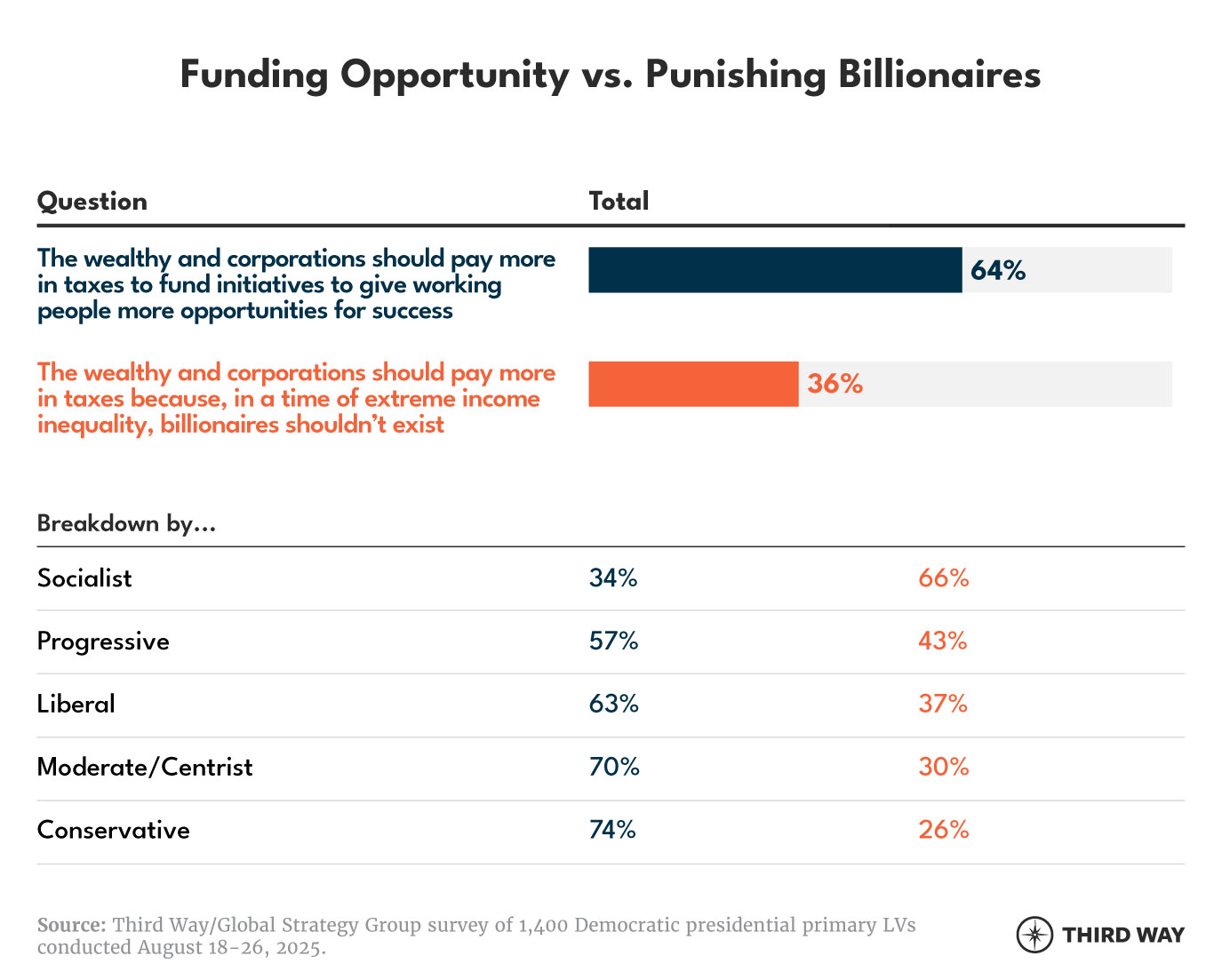
Democratic primary voters also overwhelmingly want to reform capitalism over moving to a socialist system.
- 61% said they would prefer properly regulated capitalism with guardrails to prevent abuse as opposed to 39% who said capitalism has failed and that we need to move toward socialism.
- 74% of moderates and 62% of liberals prefer capitalism.
- Socialists obviously prefer socialism at a rate of 78%.
When asked about a series of key issues, the primary electorate sounded a lot like the median voter—although the socialists and daily social media posters often occupied a different universe.
Democrats value hard work over handouts.
Democratic primary voters prefer expanding tax credits for working people, families with children, and caregivers, while making sure it doesn’t increase inflation, compared to providing direct cash payments to families, by a 65% to 35% margin.
- Moderates clocked in at 70% and liberals at 65% for the former option.
- Socialists split 50% on both.
- Similarly, daily social media posters were split 51% to 49% in favor of the former.
By a huge margin, primary voters want politicians to take on price gouging and tariffs instead of creating government grocery stores. The former option won out 84% to 16%; though, the socialist support for the latter doubles to 34%.
Democrats value jobs with meaning and dignity over a government jobs guarantee.
Primary voters preferred providing more low-cost vocational training and apprenticeship opportunities, compared to implementing a federal universal jobs program, by a 74% to 26% margin.
- Liberals and moderates are both at 77% support for the former.
- Socialists are at 65% support for the latter.
Democratic primary voters want a balanced approach to immigration.
We gave these voters a choice between 1) investing in immigration enforcement that deports convicted criminals but protects eligible, law-abiding immigrants like Dreamers, and provides a path to citizenship or 2) decriminalizing the border and abolishing ICE.
- Democratic primary voters prefer the former 65% to 35%.
- 80% of moderates and 62% of liberals prefer the first option.
- 69% of socialists prefer the latter.
Likely primary voters want rules, not bans, on sports participation.
When asked about transgender individuals being able to participate in sports, we asked a question with three options instead of two to try to get a deeper understanding around this much-discussed issue. Half of respondents (49%) said when it comes to transgender athletes, there should be rules to keep sports fair, but they might be different depending on age, sport, and level of competition. A quarter each (25% in both cases) said transgender individuals should always be allowed to compete or never be allowed to compete in sports other than as their sex assigned at birth. A majority of liberals chose the middle “rules” option, as well as a plurality of both moderates and progressives. A majority of socialists chose always allowing transgender individuals to compete, while a majority of conservatives chose never.
Even in a primary, Democrats support accountable law enforcement.
An area of near-universal agreement among these voters is around the need to increase the number of local police, while also holding them accountable for discrimination and unlawful behavior, which gained 85% support compared to a mere 15% support for defunding the police. Socialists and progressives support for defunding the police stands at nearly double: 29%.
There are still some areas where primary voters are split.
On health care, Medicare for All (M4A) and the Affordable Care Act (ACA) are essentially tied in support among Democratic primary voters, with M4A holding a slight 52% to 48% advantage. Moderates support the ACA with 63%. Liberals are more split, at 56% support for M4A, while socialists are united in support of M4A with 83%.
On climate, an all-of-the-above energy strategy narrowly beats the Green New Deal, 53% to 47%. Moderates prefer all-of-the-above at 67%. Liberals narrowly support Green New Deal at 53%, while socialists strongly support the Green New Deal at 74%.
On higher education, an approach focused on improving student outcomes and return on investment ties with an approach focused on cancelling student loan debt and making college free, with 50% each. Moderates prefer the former, with 70% support. Liberals narrowly prefer cancelling debt, with 55% support, while socialists give 92% support to that second option. On this issue, there was a 42-point difference on net in support for debt cancellation between weekly social media posters and those who never post.
On these more 50/50 issues, there is clearly a progressive lane among primary voters, though socialists and frequent posters on social media are well outside the mainstream in this universe. And Democratic primary voters most importantly want to win, and they know these policy positions will be less popular in a general election.
The 2028 Nominee
It was crystal clear in this research: primary voters prefer someone who can get things done over someone who is an ideological warrior.
One area of unity is that all segments of primary voters, even socialists, understand that values are probably more important to making someone electable than ideological purity. Overall, 60% of Democratic primary voters say being authentic, relatable, and down-to-earth makes someone a better candidate, compared to 40% who would rather have one who stands with them on most of the major issues.
By a similar margin, these voters prefer someone who can win the general election against a Republican over someone who stands by progressive values, 61% to 39%. Liberals lead the pack at 70% preferring electability, with moderates not far behind at 63%. On this question, though, the tenth of primary voters who self-describe as progressives are split evenly, with 51% saying they want someone who stands by progressive values. And socialists come in at 57% wanting a progressive over an electable candidate.
In a forced choice between a candidate who works across the aisle to get things done (even if it means compromising) compared to sticking to progressive beliefs (even if it means getting less done), primary voters overwhelmingly choose progress over progressive by a 79% to 21% margin. Among liberals and moderates, an identical 84% choose making progress, as did 65% of progressives. Among socialists, by contrast, 66% pick sticking to progressive beliefs, even if it means getting less done.
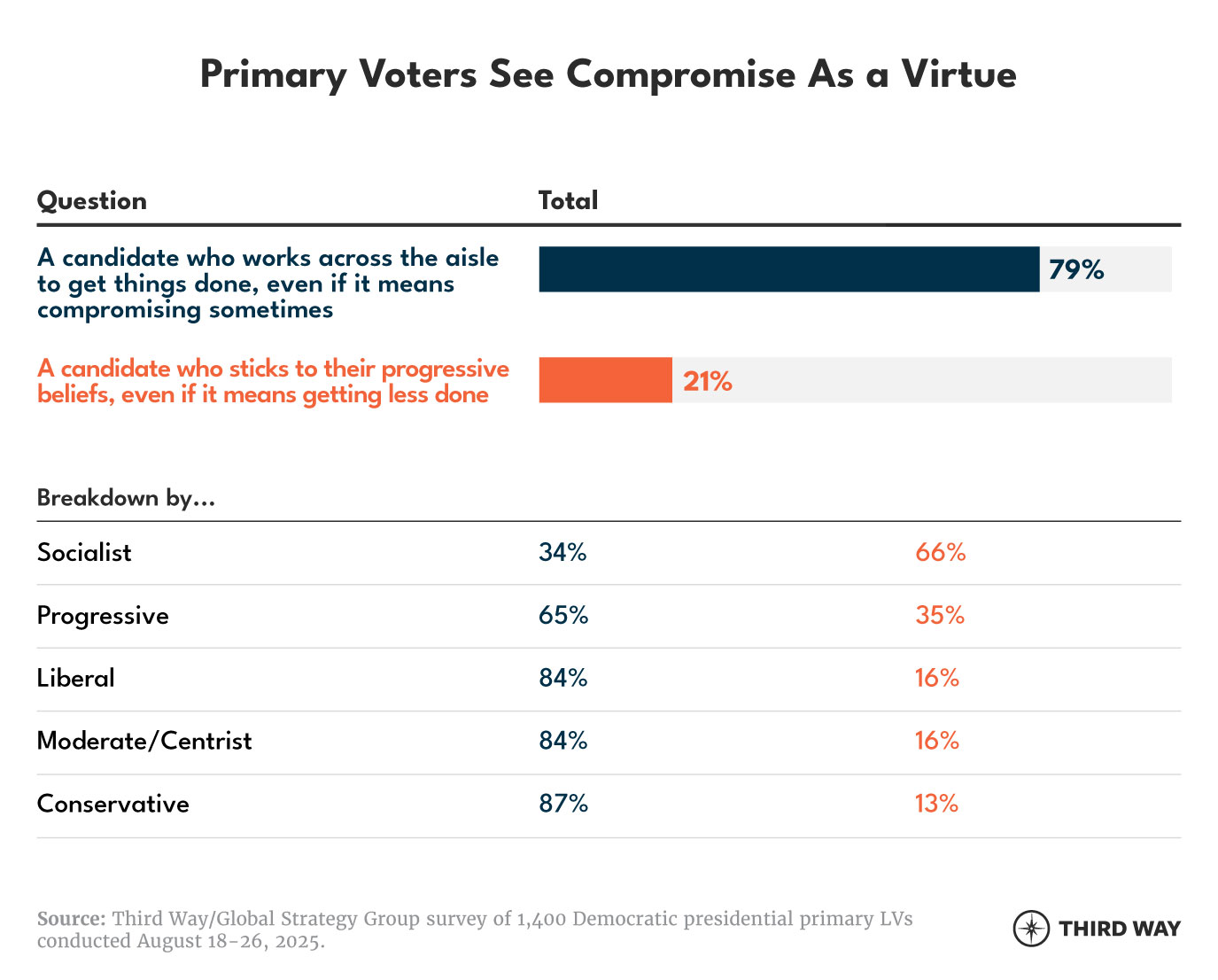
A follow-up series of open-ended questions fleshed out what’s driving these quantitative answers. Democratic primary voters are keenly aware of their need to win this election. One even went so far as to say that “it is imperative that we win the election this time. If we don't, there will no longer be an America for us to save.”
Another voter summed up the tension many seem to be juggling in this group. They want a fighter, no doubt. This voter said we needed someone to “challenge President Trump, his statements online and in person. Chaotic tariffs should be met with holding his feet to the fire.” At the very same time, this voter also said, “We just need to not go too far left. Moderation is key.” Democratic primary voters want a fighter who can appeal to the broad coalition the party needs to beat MAGA in 2028.
Conclusion
In this survey, Democratic primary voters are giving us a clear picture of what they want in a 2028 nominee. They want a candidate who is accountable to the people. One that will focus on lowering costs and creating more economic opportunity. They want a candidate who is committed to making progress over defending ideology, and someone who can win. The socialists and the terminally online are the outliers in this coalition, and that should be a guiding star in understanding who will determine the next Democratic nominee for president.
Downloads
Endnotes
Due to small sample size of socialists, the results are directional.
Subscribe
Get updates whenever new content is added. We'll never share your email with anyone.

